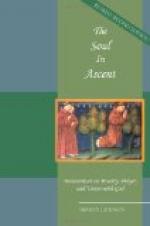immoral. The final argument for freedom is consciousness.
I know I could have chosen differently from what I
did. But how do I know? The process cannot
be pushed farther back. Consciousness is ultimate
and authoritative. But what then shall be said
of heredity? A child when first born is little
but a bundle of sensibilities. Its growth seems
to be but the unfolding of inherited tendencies.
Every man is what his ancestors have made him plus
what he has absorbed from his environment. How
can we say then that any are free? That man who
is surly, uncomfortable, ugly, as hard to endure as
a March wind, is but the extension of his father.
When one knows the elder it is difficult to do otherwise
than pity the younger. He is but living the tendencies
which were born in him and which are an inseparable
part of his nature. He cannot be genial and urbane.
Are not some born moral cripples as others are born
with physical deformities? Are not some spiritually
deaf, dumb, and blind from birth? It cannot be
doubted. We are all more or less what our fathers
were, but our surroundings do much to modify us.
Many men seem to be driven on wings of passion, as
leaves by tornadoes; and yet we know that we are free,
and that all life and conduct, individual and social,
must be ordered on that hypothesis. Teach men
that they are not free, and anarchy and chaos will
quickly follow. No freedom? Then there is
no obligation. No one feels that he ought to
do what he cannot do, and no one will try to do what
he does not feel that he ought to do. If men are
but machines, moving only as the power is turned on,
there is no moral quality in any action. If we
live in a moral world, whether we can understand it
or not, we must be free to choose for ourselves.
The possibility of the soul’s expansion depends
on its freedom. There is no right and no wrong,
no truth and no error, if it is a slave to the inheritance
with which it was born. What gives to the invitations
of Jesus a quality so serious and so solemn is the
fact that they may be rejected. The power of
choice is the most sublime endowment which man possesses.
When we have learned to know ourselves as free a long
step forward has been taken. The soul grows by
a right use of the power of choice.
How may it be adjusted to this knowledge? It
will undoubtedly grow to it, but the process will
be slow. It may, however, be hastened by a use
of the experience of others. No man should be
allowed to begin the battle of life as ignorant as
his father was. Each new soul should have the
benefit of the experience of all who have lived before.
Children should be taught by example and conversation,
in the home and the school, that the beginning of
wisdom is a right use of the experience of others.
However this lesson may be learned, and however swift
may be the process of growth, the next step in the
soul’s progress, after its realization that
it is in a moral order, must be its adjustment to the
fact that it is a free agent and sovereign over its
own choices.




